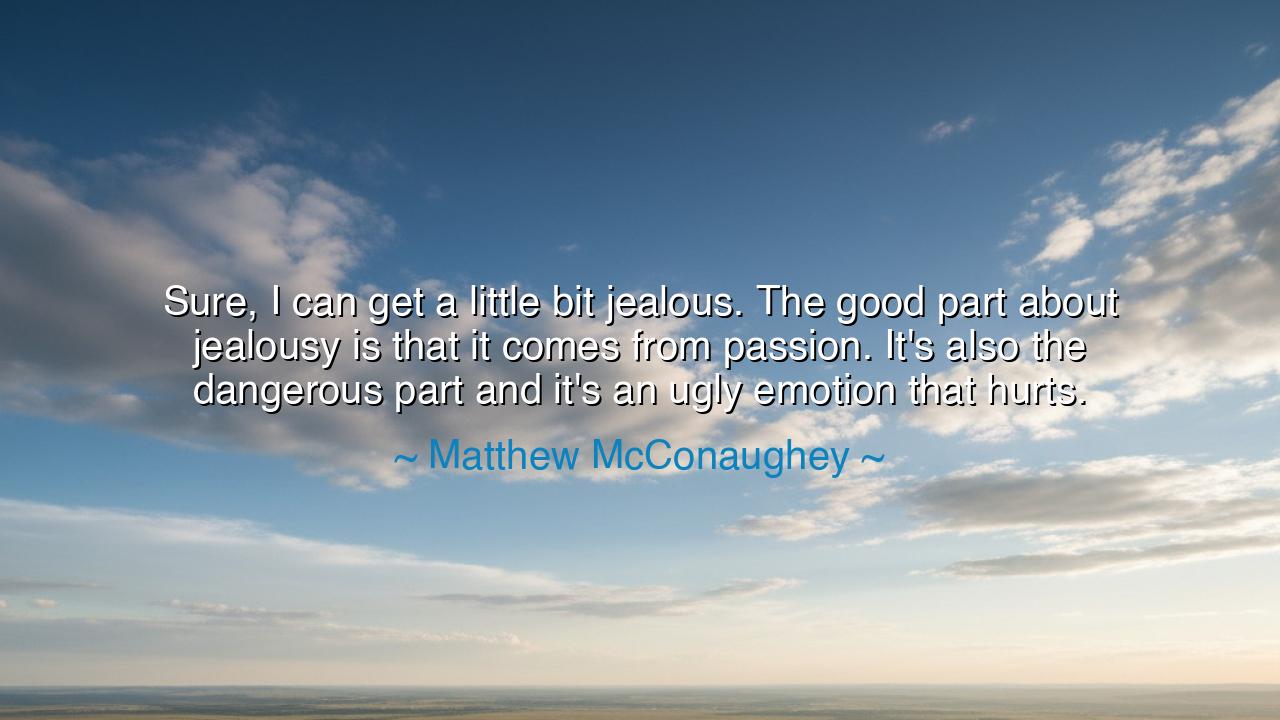
Sure, I can get a little bit jealous. The good part about
Sure, I can get a little bit jealous. The good part about jealousy is that it comes from passion. It's also the dangerous part and it's an ugly emotion that hurts.






“Sure, I can get a little bit jealous. The good part about jealousy is that it comes from passion. It's also the dangerous part and it's an ugly emotion that hurts.” So spoke Matthew McConaughey, the modern philosopher of the human heart, whose words shine with the wisdom of self-awareness and honesty. In this saying, he reveals the double-edged nature of jealousy — that strange fire which burns with both passion and pain. For like many of life’s deepest emotions, jealousy is not wholly evil, nor entirely good; it is a force that can reveal our capacity to love, yet also our weakness to possess. To understand it is to stand before one of the oldest mirrors of the soul.
The ancients knew this truth well. They saw jealousy as a flame born of desire — a spark from the fire of love that, when unchecked, could become destruction. In Greek myth, it was Hera, the queen of the gods, who embodied this paradox. Her jealousy of her husband Zeus’s infidelities was fierce, but it sprang from her passion, her deep yearning for loyalty and respect. Yet her wrath brought suffering not only to others but to herself, for jealousy, once awakened, consumes both lover and beloved. In this, McConaughey’s insight stands in the same lineage: passion gives birth to jealousy, but if not mastered, that passion turns poisonous.
When he calls jealousy a thing that hurts, he speaks the language of the wise. For jealousy is pain disguised as love — the ache of wanting to be seen, valued, and secure. It comes from fear — fear of loss, fear of not being enough, fear that our place in another’s heart is fragile. Yet, as McConaughey admits, its origin is not evil. It begins in the passion to love deeply, to connect, to hold onto something precious. But like fire, what gives warmth can also scorch. The heart that burns too fiercely to keep what it loves may destroy the very thing it cherishes.
We see this truth written in history as much as in the heart. Consider Othello, the Moor of Venice, whose story Shakespeare told to all the ages. Othello loved Desdemona with all his soul — his passion was pure, his devotion deep. Yet when jealousy entered his mind, whispered by the serpent Iago, that same passion became madness. What began as love’s flame became the fire of destruction. He mistook fear for truth and turned tenderness into cruelty. Thus, the story stands as a warning across centuries: jealousy, when not tempered by trust and wisdom, will devour love itself.
McConaughey’s reflection carries both confession and caution. He acknowledges that jealousy is human — that to feel it is to be alive, to care. But he also knows it is a dangerous companion, one that must be watched with humility. It is like a wild horse within us: powerful, beautiful, but if left untamed, it will throw us into the dust. To feel passion is to feel deeply; to govern that passion is to grow wise. For emotions are not enemies — they are teachers. Jealousy teaches us where our fears dwell, where our insecurities hide, and where our love needs healing.
This duality — that jealousy is both a mark of passion and a source of suffering — points to a deeper truth about the human condition. We are creatures of longing, always reaching beyond ourselves, always fearing what we may lose. Yet growth begins when we stop clinging and start trusting. The heart that loves without possession, that burns without consuming, becomes a beacon of true strength. To feel jealousy, then, is not shameful — it is an invitation to rise above it, to refine passion into compassion, and desire into understanding.
So, my listener, learn this lesson: when jealousy stirs within you, do not let it master you. Pause and ask — what am I afraid of losing? What does this emotion reveal about my heart? Do not feed the fire with suspicion or pride; cool it with trust, humility, and self-reflection. Channel your passion into creation, not destruction. Speak honestly, love deeply, and let freedom be the measure of your affection. For love that seeks to own is not love at all — it is fear in disguise.
Thus, in the spirit of Matthew McConaughey’s wisdom, remember: jealousy is a spark from the same flame that gives life to love. Tend it wisely, and it will warm your heart; lose control, and it will burn you whole. The noble soul learns to feel without being consumed — to love fiercely, yet let go gracefully. For that is the highest mastery of the heart, and the truest form of passion: one that gives, not grasps; one that lifts, not wounds; one that endures, even after the fire has gone out.






AAdministratorAdministrator
Welcome, honored guests. Please leave a comment, we will respond soon